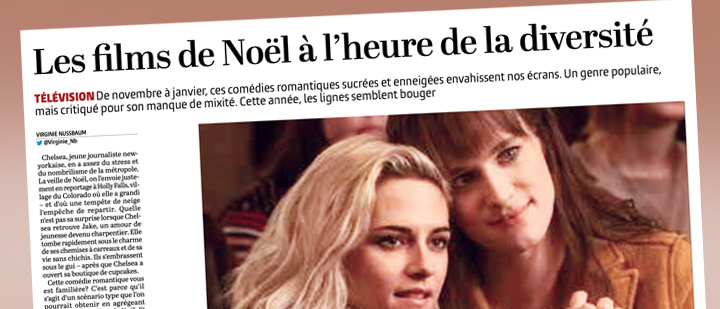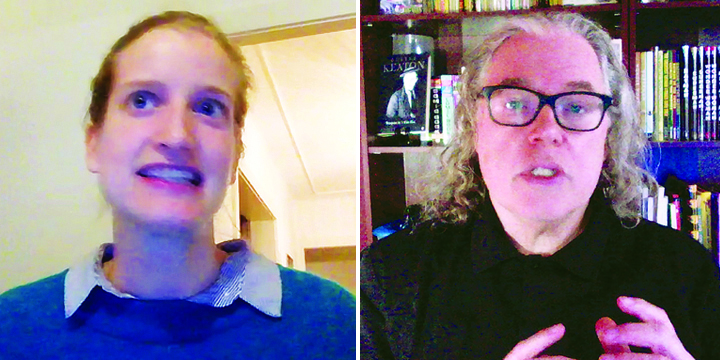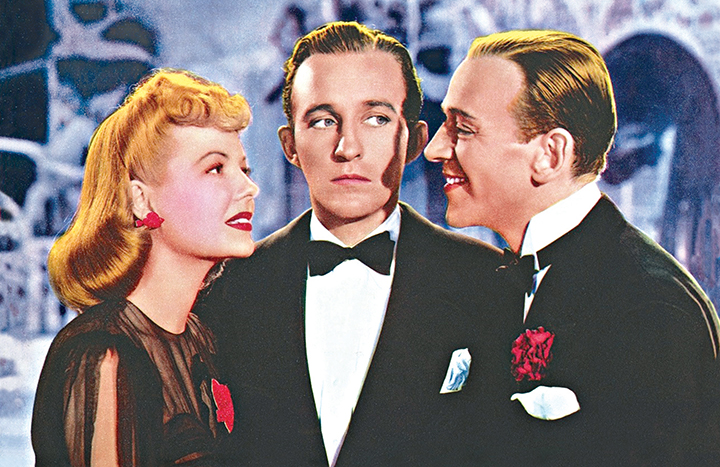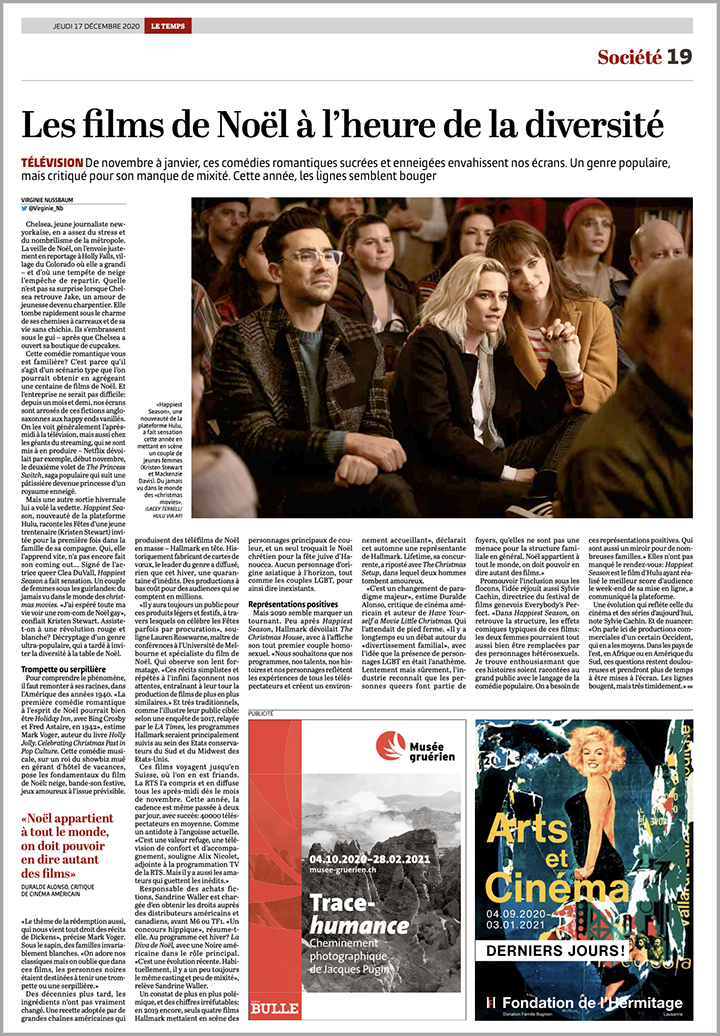
Nothing lost in translation
By Mark Voger, author
“Holly Jolly: Celebrating Christmas Past in Pop Culture”
Recently, I was interviewed by Virginie Nussbaum, a reporter for Le Temps, the French-language daily newspaper of Switzerland. Nussbaum was working on a story about the current state of Christmas movies. Having learned of my latest book “Holly Jolly” (which has a section on Christmas movies), Nussbaum contacted me, citing the Hallmark-Christmas-movie phenomenon as a topic in her planned article. I did warn Nussbaum that my expertise lies more in the history of the film genre than its present state. Nussbaum said she wanted to also hear about the origins of the genre, and so we spoke via Zoom.
Nussbaum’s article appears in today’s edition of Le Temps and on the publication’s website.

Her story is, of course, in French. My replies to Nussbaum’s queries were translated by her. According to an online translation function, her article is titled “Christmas Movies: Diversity in the Air.” It turns out that, despite my lack of familiarity with Hallmark’s output — I’ve seen three of those, and believe me, that’s plenty — Nussbaum’s angle is something I am very interested in.
Here comes a bit of “inside” journalism stuff. (Skip this paragraph unless you’re a print-media nerd.) Given my years as an entertainment reporter, I know that with this type of story angle, you want to produce a “multi-source” story — that is, to pack an appropriate number of “voices” into your piece. It’s good for balance. Often, though, you only want, or need, one quote from a given source. (Otherwise, your story would be “War and Peace.”) But on occasion, a given source may expect to give a lengthy interview, what we sometimes call a “knock-down-drag-out.” In order to make deadline, you might preface the conversation by saying something un-subtle like, “I just need a quote about …” (I realize I sound like an ogre, but that’s the reality.) So, while I was being interviewed by Nussbaum, I made sure to take cues from her, and not drag out our conversation. Even so, Nussbaum kept me on for a pleasant 20 minutes. In her finished piece, she used three quotes from me. One of these quotes was, as I recall, the most pointed in our conversation. Nicely done, Virginie.

The “nut graf” (or stated premise) for Nussbaum’s story goes like this (again translated via an online function): “From November to January, these sweet and snowy romantic comedies invade our screens — a popular genre, but criticized for its lack of diversity. This year, the line seems to have moved.”
Nussbaum warms up with: “For a month and a half, our screens have been filled with these Anglo-Saxon fictions with vanilla happy endings.”
She then writes about the cookie-cutter scripts of Hallmark, Netflix and other companies, adding: “But another winter outing has stolen the show. ‘Happiest Season,’ new to the Hulu platform, tells the holiday story of a young 30-something (Kristen Stewart) invited for the first time to meet her partner’s family. Her partner, she quickly learns, has not yet come out … Written by queer actress Clea DuVall, ‘Happiest Season’ has caused a sensation … ‘I’ve been hoping my whole life to see a gay Christmas rom-com,’ said Stewart. The ultra-popular genre was slow to invite diversity to the Christmas table.”

My little section in Nussbaum’s story bears the heading “Trumpet or mop.”
Writes Nussbaum: “To understand the phenomenon, you have to go back to its roots in 1940s America. ‘The first romantic comedy with a Christmas theme could well be “Holiday Inn,” with Bing Crosby and Fred Astaire, in 1942,’ says Mark Voger, author of the book ‘Holly Jolly: Celebrating Christmas Past in Pop Culture.’ This musical, about a popular entertainer transformed into a vacation hotel manager, lays down the fundamentals of the Christmas film: snow, a festive soundtrack, and love games with a predictable outcome.”
(A clarification for fellow movie nerds: I said “could well be” because some people count “Remember the Night” and “Bachelor Mother,” both of which preceded “Holiday Inn,” as Christmas rom-coms. Not me. I call them rom-coms with Christmas sequences, not proper Christmas movies.)
Nussbaum then writes about the lack of racial diversity in vintage films: “Under the tree, the families are invariably white. ‘We love our classic movies, but we forget that in these films, you usually don’t see black people unless they’re holding a trumpet or a mop,’ says Voger.”
More sources in Nussbaum’s story:

Lauren Rosewarne, senior lecturer at the University of Melbourne, on the Hallmark films: “These simplistic, endlessly repeated narratives shape our expectations, in turn leading to the production of increasingly similar films.”
Sandrine Waller, who obtains rights from American and Canadian film distributors: “This (diversity) is a recent development. Usually, there is always the same cast and little mixing.”
Duralde Alonso, author of “Have Yourself a Movie Little Christmas” (2020): “This is a major paradigm shift. … Slowly but surely, the industry recognizes that queer people are a part of households, that they are not a threat to the family structure. Christmas belongs to everyone. We can say the same about the movies.”
Hear, hear.
P.S.: This ain’t the first time I was translated. Back in the ’80s, I did a coupla things for Fangoria that were translated for the Spanish-language edition of the gory horror mag. My friend and colleague Wallace Stroby has had novels translated into French, German and, if I remember correctly, Czechoslovakian one time in a bootleg edition.
Le français est tellement classe. Dommage que je sois un hillbilly.
VIDEO: Guess what? “Happiest Season” wasn’t the first movie to blend LGBTQ and Christmas themes. Check out this scene from John Water‘s “Female Trouble” (1974) starring the inimitable, unforgettable Divine as bad-girl-gone-worse Dawn Davenport. May your days be merry and bright …